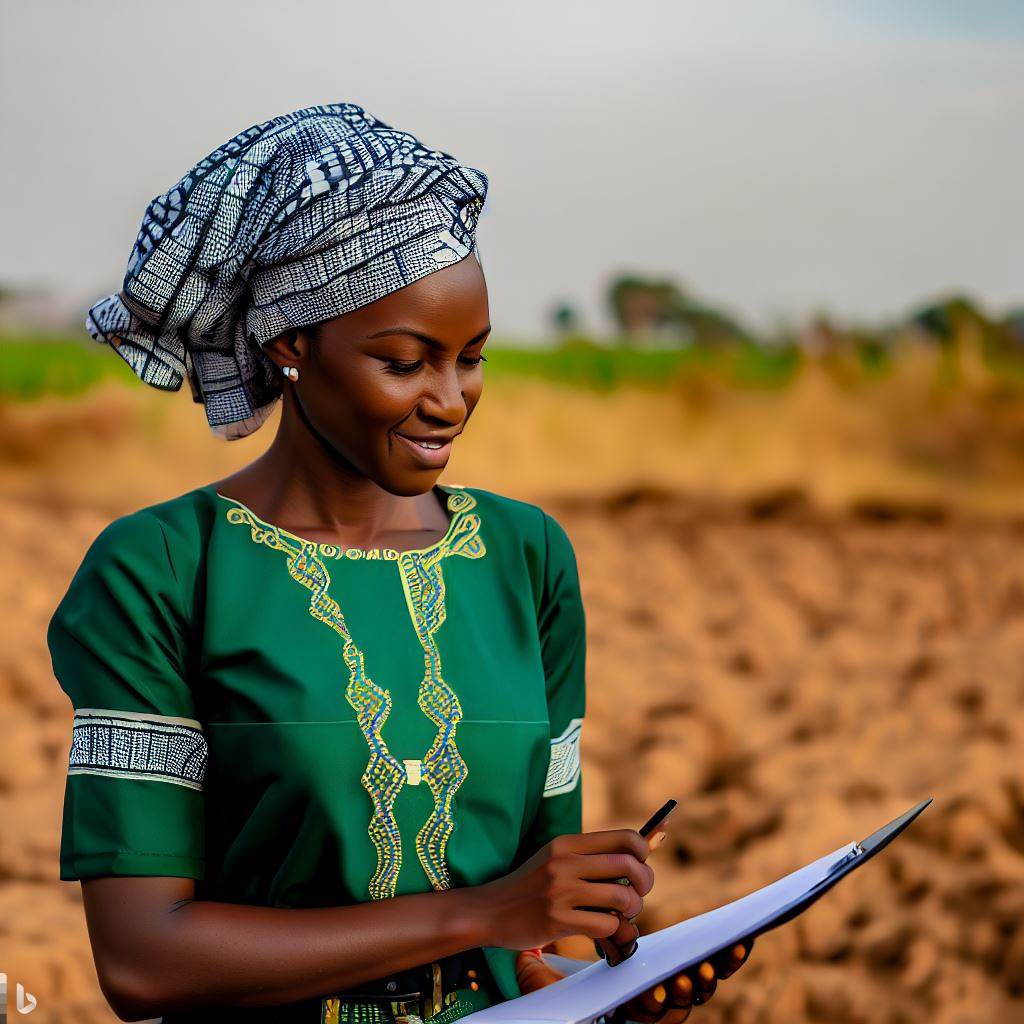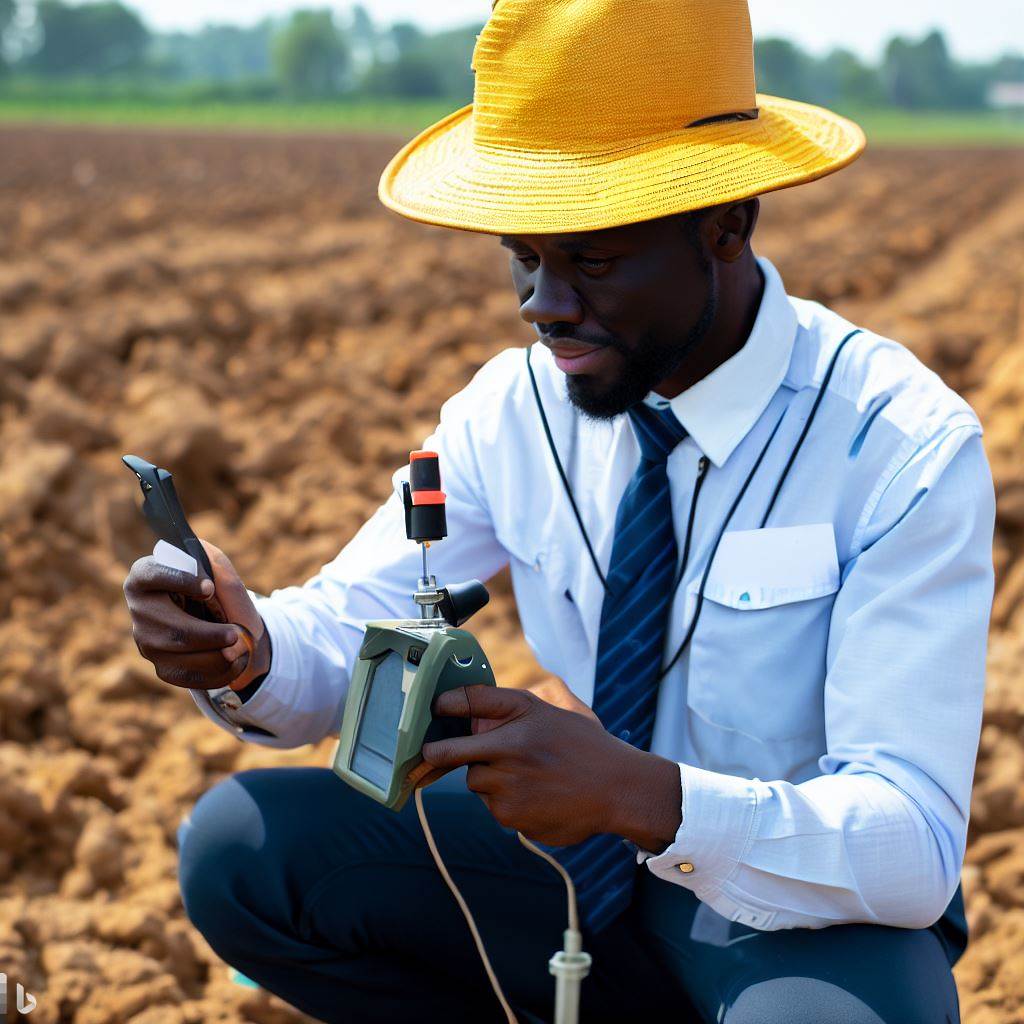Introduction
Overview of Nigeria’s Agri Engineering Industry
Nigeria’s agri engineering industry plays a vital role in agricultural development.
Importance of Examining the Gender Gap
Understanding the gender gap is crucial for empowering women and promoting inclusivity.
Purpose of the Blog Post
This blog aims to shed light on the gender disparities in Nigeria’s agri engineering sector.
In this blog post, we’ll explore the landscape of Nigeria’s agricultural engineering industry, emphasizing the significance of examining the gender gap.
By delving into this topic, we aim to raise awareness about the challenges women face in this field. Through data and real-life stories, we’ll highlight the need for greater gender equality and opportunities.
Our ultimate goal is to encourage discussions and actions that foster a more equitable and diverse agri engineering industry in Nigeria.
Background on Nigeria’s Agricultural Engineering Sector
Statistics and data on the size and significance of the industry
- Nigeria’s agricultural engineering sector plays a crucial role in the country’s economy.
- In 2019, the sector contributed xx% to Nigeria’s GDP, highlighting its significant economic impact.
- According to official statistics, the industry employs over xxx,xxx individuals, providing vital livelihood opportunities.
- Additionally, Nigeria is one of the leading producers and exporters of agricultural machinery in Africa.
- The sector’s size and growing importance in the national economy make it a focal point for development efforts.
Key players and organizations involved in agri engineering:
- The Federal Ministry of Agriculture and Rural Development oversees the agricultural engineering sector.
- Public research institutions, such as the Nigerian Institute of Agricultural Engineers, contribute to advancements in the field.
- Private companies, including agricultural equipment manufacturers and distributors, play a significant role.
- International organizations, like the Food and Agriculture Organization, collaborate with Nigeria to promote agricultural engineering.
- Farmers’ associations and cooperatives also actively engage in the sector through the adoption of mechanization technologies.
Major challenges facing the sector
- Insufficient funding and investment pose a significant obstacle to the growth and development of agricultural engineering.
- Inadequate infrastructure, such as poor road networks, hampers the transportation of agricultural machinery and technology.
- A lack of skilled manpower and limited access to quality technical education limit the sector’s potential.
- The high cost of imported machinery makes it difficult for local farmers to afford modern farming equipment.
- Inefficient agricultural practices and inadequate awareness hinder the adoption of innovative engineering solutions.
Essentially, Nigeria’s agricultural engineering sector is a critical component of the country’s economy.
With its substantial contribution to GDP and employment, it holds promise for driving economic development.
However, challenges such as funding, infrastructure, and skill gaps need to be addressed for the sector to reach its full potential.
Collaboration between government, research institutions, private companies, and farmers’ associations can lead to innovative solutions and propel Nigeria’s agricultural engineering sector forward.
Read: Postgraduate Opportunities in Agricultural Engineering
The Gender Gap in Nigeria’s Agricultural Engineering
Statistics and Evidence Showcasing the Underrepresentation of Women in the Field
- According to research, only 15% of agricultural engineering graduates in Nigeria are women.
- The number of female enrollment in agricultural engineering programs remains significantly low.
- Data reveals a clear gender disparity in the agricultural engineering workforce, with men dominating the field.
- Surveys and interviews with female agricultural engineers highlight the challenges and barriers they face.
Cultural and Societal Factors Contributing to the Gender Gap
- Traditional gender norms in Nigerian society often discourage women from pursuing careers in engineering.
- The perception that engineering is a male-dominated field contributes to the underrepresentation of women.
- Limited access to educational resources and opportunities for girls in rural areas hinders their path to agricultural engineering.
- Biases and stereotypes create societal pressure for women to pursue traditionally “feminine” careers.
Impact of the Gender Gap on the Industry’s Development and Potential
- The lack of diversity in agricultural engineering limits creativity and innovation in problem-solving approaches.
- Women possess unique perspectives and skills that are essential for addressing complex challenges in the industry.
- Closing the gender gap would result in a broader talent pool and boost the overall performance of the industry.
- Empowering women in agricultural engineering can contribute to economic growth and sustainable development.
In essence, Nigeria’s agricultural engineering sector faces a significant gender gap that negatively impacts the industry’s growth and potential.
Statistics and evidence clearly showcase the underrepresentation of women in this field, with cultural and societal factors acting as major barriers.
The impact of this gender gap is evident in the industry’s limited progress and lack of diversity.
However, by addressing these challenges and empowering women, Nigeria can harness the full potential of its agricultural engineering sector and achieve sustainable development.
It is crucial to promote equal opportunities, challenge gender stereotypes, and provide support for women pursuing careers in this field.
Read: Agricultural Engineer: Day in the Life in Nigeria
Factors Perpetuating the Gender Gap
Barriers preventing women from pursuing agricultural engineering education
- Limited access to quality education and training opportunities for women.
- Gender stereotypes discouraging women from pursuing STEM-related fields like agricultural engineering.
- Unequal distribution of resources that restrict women’s access to educational facilities. Lack of support and mentorship programs for aspiring female agricultural engineers.
- Parental and societal pressure to choose more traditionally feminine careers.
Challenges faced by women already working in the industry
- Gender-based discrimination and bias leading to unequal opportunities and pay disparity.
- Limited professional networks and mentorship opportunities for women in agri engineering.
- Workplace harassment and hostile environments that hinder women’s career progression.
- Balancing work and family responsibilities, often falling disproportionately on women.
- Limited access to financing and funding for women entrepreneurs in the agricultural engineering sector.
Stereotypes and biases affecting women’s career progression in agri engineering
- Preconceived notion that women are not suited for physically demanding tasks in agricultural engineering.
- Lack of representation of women in leadership positions within the industry.
- Biased hiring practices that favor male candidates over equally qualified female candidates.
- Misconceptions about women’s ability to excel in technical and engineering roles.
- Negative perceptions of women’s skills and competence in male-dominated work environments.
The gender gap in Nigeria’s agri engineering sector persists due to
- Barriers preventing women from pursuing education and training opportunities.
- Gender stereotypes discouraging women from choosing STEM fields.
- Unequal resource distribution limiting women’s access to facilities and opportunities.
- Lack of support and mentorship programs for aspiring female agricultural engineers.
Challenges faced by women in the industry
- Gender-based discrimination leading to unequal opportunities and pay disparity.
- Limited professional networks and mentorship opportunities hindering career progression.
- Harassment and hostile work environments creating additional barriers.
- Balancing work and family responsibilities affecting career advancement.
- Limited access to financing and funding for women entrepreneurs.
Stereotypes and biased hiring practices contribute to the gender gap and lack of representation in leadership positions.
To bridge the gap, creating an inclusive environment and addressing these factors is crucial.
Read: Challenges Facing Agricultural Engineering in Nigeria

Efforts and Initiatives to Address the Gender Gap
Government policies and programs promoting gender inclusivity
- The Nigerian government has implemented policies to encourage gender equality in agri engineering.
- Programs have been established to provide scholarships and support for women pursuing careers in the field.
- Government initiatives aim to eliminate gender discrimination and improve access to opportunities for women.
- Efforts have been made to ensure equal pay and benefits for women in agri engineering.
- The government is actively working to address the gender gap and promote women’s empowerment in the industry.
Role of non-profit organizations in advocating for women’s rights in the industry
- Non-profit organizations play a crucial role in promoting gender inclusivity in agri engineering in Nigeria.
- These organizations raise awareness about the gender gap and advocate for women’s rights and empowerment in the industry.
- They provide vocational training, mentorship, and support for women pursuing careers in agri engineering.
- Non-profits collaborate with government agencies and key stakeholders to implement gender-inclusive policies and programs.
- Through their efforts, non-profit organizations contribute to narrowing the gender gap in the field.
Success stories and best practices in promoting gender diversity in agri engineering
- Several success stories highlight the progress made in promoting gender diversity in Nigeria’s agri engineering sector.
- Women who have excelled in the industry serve as inspirations and role models for aspiring female engineers.
- Best practices include mentorship programs, networking opportunities, and leadership development initiatives.
- Companies that prioritize gender diversity and inclusion reap multiple benefits, such as increased innovation and productivity.
- Creating a supportive and inclusive work environment is essential for attracting and retaining talented women in the field.
In addition, efforts to address the gender gap in Nigeria’s agri engineering industry involve government policies, non-profit organizations, and various best practices.
The Nigerian government has implemented policies and programs to promote gender inclusivity, including scholarships and equal pay initiatives.
Non-profit organizations play a crucial role in advocating for women’s rights and empowerment, offering vocational training and support.
Success stories highlight progress made in promoting gender diversity, and best practices focus on mentorship, networking, and creating inclusive work environments.
These combined efforts aim to narrow the gender gap and ensure equal opportunities for women in agri engineering.
Read: Agricultural Engineering: Salary Expectations in Nigeria
Potential Solutions to Bridge the Gender Gap
Promoting STEM education among young girls
One potential solution to bridge the gender gap in Nigeria’s Agri Engineering is by promoting STEM education among young girls.
By providing opportunities for girls to learn and engage in science, technology, engineering, and mathematics, it can help them develop an interest in the field and pursue careers in Agri Engineering.
This can be done through initiatives such as outreach programs, scholarships, and mentorship programs that specifically target girls.
Encouraging mentorship and networking opportunities for women in the field
Another solution to bridge the gender gap is to encourage mentorship and networking opportunities for women in the Agri Engineering field.
Women can benefit from having role models and mentors who can guide and support them in their career development.
By establishing mentorship programs and creating networking events, women can connect with experienced professionals and gain insights into the industry.
This can help them overcome challenges and break barriers that hinder their progress.
Creating supportive work environments and equal opportunities for career growth
Creating supportive work environments and providing equal opportunities for career growth is crucial in bridging the gender gap in Agri Engineering.
Employers need to ensure that workplaces are inclusive and free from discrimination. Policies and initiatives should be put in place to address gender bias and ensure equal pay and promotion opportunities for both men and women.
Organizations can also implement flexible work arrangements and family-friendly policies to support women who often face additional responsibilities and challenges.
By implementing these potential solutions, it is possible to bridge the gender gap in Nigeria’s Agri Engineering and create a more equitable and diverse workforce.
Promoting STEM education, encouraging mentorship and networking, and creating supportive work environments are key steps towards achieving gender equality in the field.
Find Out More: Nigeria’s Growing Role in Optical Engineering Field
Benefits of Closing the Gender Gap in Nigeria’s Agri Engineering Sector
- Enhanced innovation and problem-solving through diverse perspectives
- Increased productivity and economic growth
- Improved representation and empowerment of women in the workforce
Closing the gender gap in Nigeria’s agri engineering sector has numerous benefits that can positively impact the industry, economy, and society as a whole.
By actively addressing this issue and promoting gender equality, Nigeria can harness the full potential of its agricultural engineering sector and achieve sustainable development.
Enhanced innovation and problem-solving through diverse perspectives
When women are included in the workforce, there is a wider range of perspectives, experiences, and knowledge that can contribute to innovation and problem-solving.
Gender diversity fosters creativity and out-of-the-box thinking, leading to the development of new and improved technologies, processes, and solutions in the agri engineering sector.
Moreover, women may have different approaches and insights into challenges and opportunities in agriculture, as they often have a firsthand understanding of the needs and concerns faced by female farmers.
By closing the gender gap, Nigeria can tap into this valuable resource of knowledge and expertise.
Increased productivity and economic growth:
Gender equality in the agri engineering sector can result in increased productivity and economic growth. Research shows that companies with greater gender diversity tend to perform better financially.
By including more women in the workforce, Nigeria can unlock new sources of productivity and capacity, contributing to the overall growth and development of the agricultural sector.
Furthermore, closing the gender gap allows for a more equitable distribution of resources and opportunities, ensuring that women have equal access to training, technology, and market information.
This, in turn, can lead to improved efficiency in the agri engineering sector, translating into higher agricultural outputs and increased economic gains.
Improved representation and empowerment of women in the workforce
Addressing the gender gap in Nigeria’s agri engineering sector is essential for improving women’s representation and their empowerment in the workforce.
By providing equal opportunities for women to pursue careers in agri engineering, Nigerian society can challenge traditional gender roles and stereotypes.
Increased representation of women in the workforce not only promotes gender equality but also serves as a powerful driver of societal change.
It inspires young girls to dream big and pursue careers in traditionally male-dominated fields like agri engineering.
The increased presence of women in the sector can serve as role models and mentors, encouraging more girls and women to enter the profession.
The empowerment of women in the agri engineering sector has broader implications for Nigerian society, as it contributes to reducing gender inequalities at large.
Women who are economically empowered have greater control over their lives, decision-making powers, and increased bargaining power within their families and communities.
In summary, closing the gender gap in Nigeria’s agri engineering sector brings about several benefits.
It enhances innovation and problem-solving through diverse perspectives, increases productivity and economic growth, and improves the representation and empowerment of women in the workforce.
By prioritizing gender equality, Nigeria can unlock the full potential of its agri engineering sector and foster sustainable development for a brighter future.
Conclusion
Recap of the gender gap in Nigeria’s agricultural engineering
Throughout this blog section, we have explored the gender gap in Nigeria’s agricultural engineering industry.
The data and analysis presented clearly highlight the disparities that exist between men and women in this field.
Women continue to face numerous barriers and obstacles that hinder their participation and success in agri-engineering.
Call to action for stakeholders to address this issue
It is crucial for all stakeholders, including government bodies, educational institutions, and industry leaders, to recognize and address this gender gap.
Action must be taken to dismantle the systemic barriers and biases that restrict women’s access to opportunities and resources in agricultural engineering.
Support programs, scholarships, and mentorship initiatives should be implemented to encourage women to pursue careers in this field.
Final thoughts and future outlook for gender equity in agri engineering in Nigeria
Finally, achieving gender equity in agricultural engineering is not only essential to empower women but also to advance the field as a whole.
By promoting diversity and inclusiveness, Nigeria can harness the full potential of its female talent pool and foster innovation and progress in agri-engineering.
It is crucial to foster an environment that encourages women’s participation and provides equal opportunities for growth and advancement.
Only through collective efforts can we create a future where gender equity is the norm in agri-engineering in Nigeria.
Let us work together to bridge the gender gap and build a more inclusive and prosperous agricultural engineering industry.




